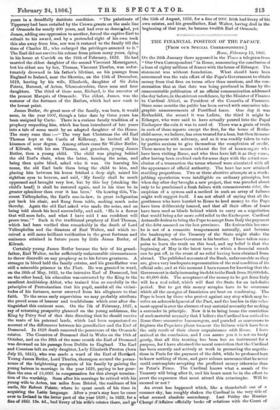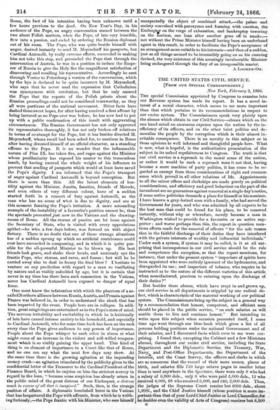Rome, February 13, 1866. Ox the 24th January there appeared
in the Times a telegram from "Our Own Correspondent " in Rome, announcing the conclusion of a loan of eighty millions of francs with the house of Erlanger. The statement was without foundation. What should have been announced was the vain effort of the Pope's Government to obtain money from that firm on terms other than usurious, and the con- sternation that at, that date was being produced in Rome by the unaccountable publication of an official communication addressed the day before, in the strictest confidence, by the Minister of Finance to Cardinal Alfieri, as President of the Consulta of Finances. Since some months the public has been served with successive tele- graphic announcements of Pontifical loans. One day it was Rothschild, the second it was Lafitte, the third it might be Erlanger, who were said to have actually poured into the Papal Exchequer the coin it was in need of. There was a grain of truth in each of these reports except the first, for the house of Roths- child never, we believe, has even treated for a loan, but then its name is synonymous with solvency, and so it was readily taken in vain by parties anxious to give themselves the complexion of credit. These names by no means exhaust the list of loanmongers wh) have been visiting Rome, and who thus have left it as they cause, after having been credited each for some days with the actual con- clusion of a transaction the terms whereof were circulated with all the appearance of official authority. The hoax has now attained startling proportions. Two or three abortive attempts at a stock- jobbing speculation were intelligible on ordinary principles, but when day after day brought a new project, that was paraded about only to be proclaimed a fresh failure with commensurate éclat, the suspicion of a system and a method in such an array of failures might well suggest itself. I am not afraid of saying that all the gentlemen who have hurried to Rome to lend money to the Pope have been deliberately hoaxed, and that all their offers of loans have been used as blinds behind which to carry on a negotiation that would bring a far more solid relief to the Exchequer. Cardinal Antonelli desires to bring the Pope to accept from Italy the payment of the debt assessed on the lost provinces. He desires this because he is not of a romantic temperament naturally, and because the bankruptcy of the Treasury of the State might shake the Bank of Rome, whose Governor is his brother. I have taken soma pains to learn the truth on this head, and my belief is that the beginning of May is the latest term to which a financial smash can be put off, in the event of no relief having been obtained front abroad. The published accounts of the Bank, unfavourable as they are, give a very inadequate representation of the real condition of its official side; and at this moment I have reason for knowing that the Government is daily increasing its debt to the Bank from 30,000dols. to 40,000 dots. The acceptance of the money to be got from Italy will be a real relief, which will float the State for an indefinite period. But to get this money scruples have to be overcome which all the energies of fanaticism are bent on confirming. The Pope is beset by those who protest against any step which may in- volve an acknowledgment of the Pact, and the burden in this vehe- ment appeal is ever the absence of any material necessity for making a surrender in principle. Now it is to bring home the conviction of such material necessity that I believe the Cardinal has enticed to Rome three successive loanmongers, and paraded as scarecrows to frighten the Pope into pliant humour the failures which have been the only result of their closer acquaintance with Rome. I have arrived at the conclusion, and I can assure you it is not on hasty
gossip, that all this treating has been but an instrument for a purpose, for I have obtained the moral conviction that the Cardinal has been secretly and actively at work in promoting the negotia- tions in Paris for the payment of the debt, while he professed here to know nothing of them, and gave solemn assurance that he never could contemplate accepting the proffered money otherwise than as Peter's Pence. The Cardinal knows what a smash of the Treasury will bring after it, and his heart must be in the effort to avert the exposures that must attend this catastrophe. Will he succeed or not ?
An event has happened which, like a thunderbolt out of a summer sky, has roughly shaken the Cardinal in the very tide of what seemed absolute ascendancy. Last Friday the Russian Chargé d'Affaires officially broke off relations with the Court of
Rome, the fact of his intention having been unknown until a few hours previous to the deed. On New Year's Day, in his audience of the Pope, an angry conversation ensued between the two about Polish matters, when the Pope, of late very irascible, flew into a passion, and ended by ordering the Russian diplomat out of, his room. The Pope, who was quite beside himself with anger, desired instantly to send M. Meyendorff his passports, but Cardinal Antonelli, by really extreme efforts, succeeded in making him not take this step, and persuaded the Pope that through the intervention of Austria, he was in a position to induce the Empe- ror of Russia to give the Holy See the magnificent satisfaction of disavowing and recalling his representative. 'Accordingly he sent through Venice to Petersburg a version of the conversation, which by the bye is declared to be quite incorrect by M. Meyendorff, who says that he never used the expression that Catholicism was synonymous with revolution, but that he only assured the Pope that the reports of the Polish priests about the Russian proceedings could not be considered trustworthy, as they all were partizans of the national movement. Bitter facts have dashed these sweet hopes, for after having received a first affront by being lectured as no Pope ever was before, he has now had to put up with a public confirmation of this insult with aggravating circumstances. The Russian Government has not only approved its representative thoroughly, it has not only broken off relations in terms of co ntempt for the Pope, but it has besides directed M. Meyendorff, whose recall had been asked for, to continue in Rome after having divested himself of an official character, as a standing offence to the Pope. It is no wonder that the inflammable nature of Pius IX. has taken fire, and rages against the Minister whose pusillanimity has exposed his master to this tremendous insult, by having exerted the whole weight of his influence to prevent that sending of passports which would at least have saved the Pope's dignity. I am informed that the Pope's transport of anger against Cardinal Antonelli is beyond conception. But there is more than this. All the latent elements of hos- tility against the Minister, Jesuits, fanatics, friends of Merode, and even others of very different colour, have of a sudden started forth in a concert of fury against Antonelli, as the man who has no sense of what is due to dignity, and are at this moment fanning the Pope's irritation. A more astounding example of the instability of a favourite's position cannot be, than the spectacle presented just now in the Vatican and the drawing- rooms of Rome. All the storms of passion are let loose against the Secretary of State, who is visited with every opprobrious epithet—he who, a few days before, was fawned on with abject flattery. There is no doubt that one of those strange situations has of a sudden sprung up which no artificial contrivance could ever have succeeded in compassing, and in which it is quite pos- sible for the all-powerful Minister to be blown up. His best friends look grave, and shake their heads, and anxiously eye the frantic Pope, who storms, and raves, and foams ; but will be be carried away also to deal in frenzy the final blow? I hesitate to venture on any prediction with regard to a man so vacillating by nature and so visibly enfeebled by age, but it is certain that never in my time has there been such commotion in the Vatican, never has Cardinal Antonelli been exposed to danger of equal force.
One must know the infatuation with which the phantom of a so- calledN orthern alliance between Russia, Austria, and Prussia against France was believed in, in order to understand the shock that has been imparted by the event. People here are in collapse. In addi- tion, great misgivings are entertained as to the Pope's state of mind. The nervous irritability and excitability in which he is habitually of late have caused intense anxiety to his household, and especially to Cardinal Antonelli, who for some time back has been on the rack every time the Pope gives audience to any person of importance. People about the Pope whisper to each other in alarm at what might come of an increase in the violent and self-willed tempera- ment 'which is so visibly gaining the upper hand. This kind of thing is an element of importance in a Court like that of Rome, and no one can say what the next few days may show. At the same time there is the growing agitation at the impending money crash—an agitation stimulated by the publicity given to the confidential letter of the Treasurer to the Cardinal President of the Finance Board, in which he enjoins on him the strictest secrecy in regard to the loan, " because some suspicion has already arisen in the public mind of the great distress of our Exchequer, a distress much in excess of all that is imagined." Such, then, is the strange position of affairs. A diplomatic bombshell burst in the Vatican that has bespattered the Pope with affronts, from which he is writh- ing furiously,—the Pope frantic with his ]Minister, who sees himself unexpectedly the object of combined attack,—the palace and society convulsed with paroxysms and foaming with emotion, the Exchequg on the verge of exhaustion, and bankruptcy towering on the sorizon, one loan after another gone off in smoke,— not without the Prime Minister himself having been an underhand agent in this result, in order to facilitate the Pope's acceptance of an arrangement more suitable to his interests—and then of a sudden, just as all things seemed to be irresistibly going on as his cunning devised, the very existence of this seemingly invulnerable Minister being endangered through the fury of an irresponsible master, A LOOKER-ON.































 Previous page
Previous page